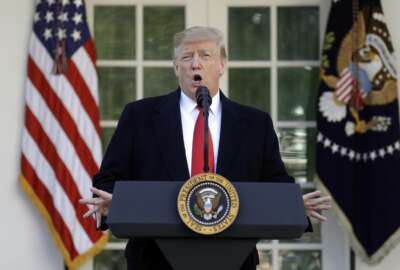

The House is set to clear a 2.6 percent federal pay raise for civilian employees this year. The Senate already has a companion of the Federal Civilian Workforce Pay...
Federal employees are one step closer to a pay raise.
Despite some last-minute theatrics, the House passed the Federal Civilian Workforce Pay Fairness Act Wednesday, which would grant a 2.6 percent raise to employees for the rest of the year. The legislation would bring federal pay for civilian employees in line with that of the military for the rest of this year — and reverse a pay freeze President Donald Trump placed on civilians at the end of 2018.
The bill was supposed to easily pass the House, until Rep. Susan Brooks (R-Ind.) issued a motion to recommit, which would have prohibited across-the-board pay raises for federal employees who have been disciplined for sexual misconduct.
“The bill before the House today treats every federal employee the same: good, bad, competent or not,” Brooks said. “They all get a pay raise on top of automatic step increases and promotions. Earlier today, my colleagues have asked, ‘Doesn’t everyone deserve a pay raise?’ The answer is no. A broken disciplinary process in our federal agencies make it nearly impossible to fire anyone. This Democrat-bill is nothing short of a handout to individuals who engage in sexual misconduct in the workplace, and that is wrong.”
Her motion caused a literal uproar among House Democrats, including one of the bill’s original co-sponsors, and sparked a broader and spirited debate over disciplinary actions and pay-for-performance in the federal workforce.
“We’re here to honor the federal workforce, not slander them with insinuation. To listen to the gentlelady from Indiana, one might infer that the federal government is riddled with all kinds of nasty, near crimes and offenses,” Rep. Gerry Connolly (D-Va.) said. “Let us not be distracted by what’s really going on, we’re simply trying to — after the worst shutdown in American history — say to our own employees … you’re valued. You’re respected.”
The bill ultimately passed with a 259-161 vote — without Brooks’ amendment.
The 2.6 percent raise for civilian employees would apply as of the first pay period beginning on or after Jan. 1., meaning the pay boost would be a retroactive one.
The bill would also freeze pay for political appointees in 2019, reversing an ill-timed consequence of government’s collective failure to pass appropriations bills or stop-gap funding for federal agencies by the end of 2018.
Pay for political appointees has been frozen since 2014.
Connolly (D-Va.) and House Majority Leader Steny Hoyer (D-Md.) introduced the bill shortly before Trump announced his intention to support a three-week, shutdown-ending continuing resolution last Friday.
But House Republican members also balked at the speed at which the legislation moved through the chamber.
“All of a sudden what we have here is a rush to try to send a message that Republicans are awful to federal workers, and Democrats are not,” Rep. Mark Meadows (R-N.C.) said Tuesday afternoon at a House Rules Committee hearing on the bill.
Meadows said the House Oversight and Reform Committee should have debated and marked up the pay raise bill before sending it to the rules committee Tuesday afternoon. He also cited a Congressional Budget Office study that found, on average, that government spends 17 percent more on employee compensation than the private sector.
The bill has a Senate companion, which both Maryland and Virginia senators, along with Sen. Brian Schatz (D-Hawaii), introduced Tuesday.
“Federal workers have shown during this historic shutdown how invaluable they are to the daily functioning of our nation. They should be compensated accordingly,” Sen. Ben Cardin (D-Md.) said in a statement. “Congressional approval of a small increase in pay, comparable to what has been granted to our service members, would be a helpful measure in restoring faith in a system that left them in financial limbo for a record 35 days.”
It’s unclear how the bill will fare in the Senate, but it’s clear bipartisan support for a federal pay raise in 2019 exists. A 1.9 percent federal pay raise initially cleared the Senate as part of the still-unfinished 2019 appropriations process.
The House voted several times on separate appropriations bills and omnibus spending packages over the government shutdown earlier this month. In many of those cases, a 1.9 percent federal pay raise easily cleared the House.
If the federal pay raise bill doesn’t pass the Senate — or if the President doesn’t sign it — there are other options. Congress still needs to finalize seven 2019 appropriations bills before the three-week CR deadline. A spending deal may ultimately include a 1.9 percent federal pay raise for the rest of the year, which both the House and Senate have already passed in various capacities.
Federal employee organizations praised the bill’s passage on Wednesday afternoon.
The National Treasury Employees Union called the 2.6 percent raise “appropriate” and “long overdue.”
The National Active and Retired Federal Employees Association (NARFE) also applauded the federal pay raise.
“Desperately needed after 35 dysfunctional days and a third shutdown in a year, it ensures that federal employee pay rates remain competitive with the private sector so that our government can recruit and retain a well-qualified and high-performing workforce,” NARFE President Ken Thomas said in a statement.
Copyright © 2025 Federal News Network. All rights reserved. This website is not intended for users located within the European Economic Area.
Nicole Ogrysko is a reporter for Federal News Network focusing on the federal workforce and federal pay and benefits.
Follow @nogryskoWFED

